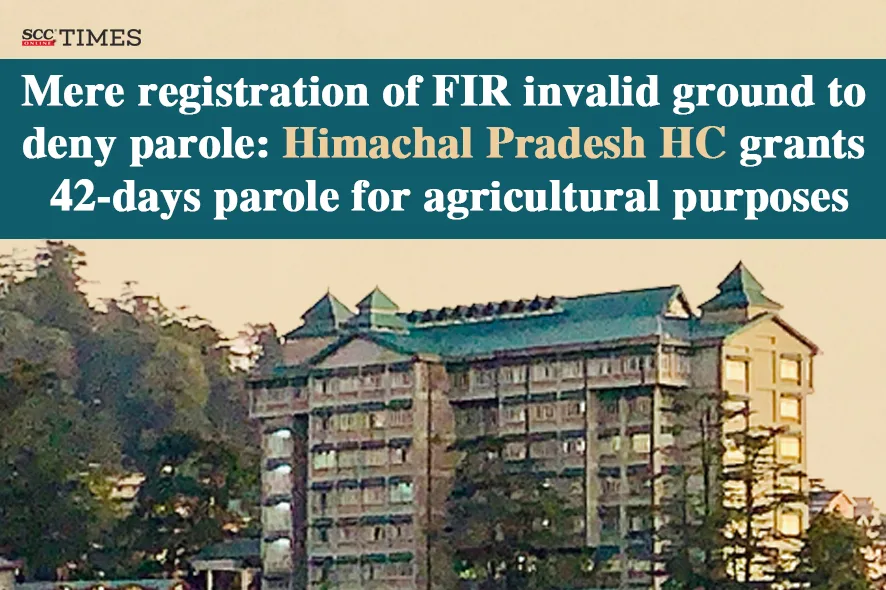Himachal Pradesh High Court: In a writ petition filed by the petitioner-accused under Article 226 of the Constitution seeking his release on parole in a case where he was sentenced for offences under Section 354-B of the Penal Code, 1860 (‘IPC’), Sections 6 and 14(3) of the Protection of Children from Sexual Offences Act, 2012 (‘POCSO Act’), and Sections 66-E and 67-B of the Information Technology Act, 2000 (‘IT Act’), but his parole request was rejected by the District Magistrate, Kangra, a Single Judge Bench of Virender Singh, J., quashed the order of rejection and held that mere registration of an FIR, while the accused was previously released on parole, could not be the ground to deny his request because the prisoners must be allowed to maintain their family and social ties.
Background:
The accused contended that while on parole, a scuffle took place and though he was innocent, he came to know that on the basis of twisted facts, an FIR was registered against him on 14-01-2024, under Sections 341, 323, 504 and 506 IPC. The accused was on bail in the said FIR. On 03-07-2024, the accused applied for a grant of parole for agricultural purposes for a period of 42 days. The District Magistrate rejected his application on 31-12-2024 without assigning any justifiable reason. The accused prayed for the order passed by the District Magistrate, rejecting his parole, to be quashed and set aside and requested to allow his release on parole.
The respondents submitted that the accused’s request was duly forwarded to the District Authorities and the District Magistrate did not grant the request as the victim’s mother had objected to the same raising a severe concern that if the accused was released on parole, he might harm the victim and her family. The request was also rejected on the ground that during the accused’s previous parole in January 2024, an FIR was registered against him on account of his involvement in an altercation.
Analysis and Decision:
The Court relied on Asfaq v. State of Rajasthan, (2017) 15 SCC 55, wherein the Supreme Court observed that for granting parole “the most important ground, which stood out, was that a prisoner should be allowed to maintain family and social ties. This reason found justification in one of the objectives behind sentence and punishment, namely, reformation of the convict. The provisions of parole and furlough, thus, provided for a humanistic approach towards those lodged in jails.”.
The Court noted that as per the Custody Certificate, the sentence undergone by the accused was five years and eighteen days. The Pradhan of the Gram Panchayat, Pihdi, had no objection, in case, parole, as prayed for by the accused, was granted to him. Along with that, the statements of Lambardar of the Gram Panchayat Pihidi, Ward Member and some villagers were also placed on record, wherein, they had given no objection for the grant of parole.
The Court further noted that the grounds upon which the parole was denied was the report of the District Magistrate. The report stated during the previous parole an FIR was registered against the accused, which the accused called false and frivolous. The Court referred to Mafabhai Motibhai Sagar v. State of Gujarat, 2024 SCC OnLine SC 2982, and observed that the result of the said FIR could not be anticipated and therefore, it could not be taken as a negative factor for considering his parole. The Court opined that mere registration of the FIR could not be made the basis to decline parole to the accused as the prisoners must also be given an opportunity to solve their personal and family problems and to enable them to maintain their links with society. Another ground stated in the report rejecting his parole was that the victim’s mother had expressed safety concerns to which the Court observed that reasonable conditions could be imposed, in case the parole was granted to the accused.
Based on the above analysis, the Court found that the rejection order dated 31-12-2024 passed by the District Magistrate was not sustainable in the eyes of law and quashed and set it aside. The accused was ordered to be released on parole for a period of 42 days.
[Sachin Kumar v. State of H.P., 2025 SCC OnLine HP 4720, decided on 12-09-2025]
Advocates who appeared in this case:
For the Petitioner: Lalit K. Sehgal, Legal Aid Counsel.
For the Respondents: Varun Chandel, Additional Advocate General, with Rohit Sharma and Ranjna Patial, Deputy Advocates General.





